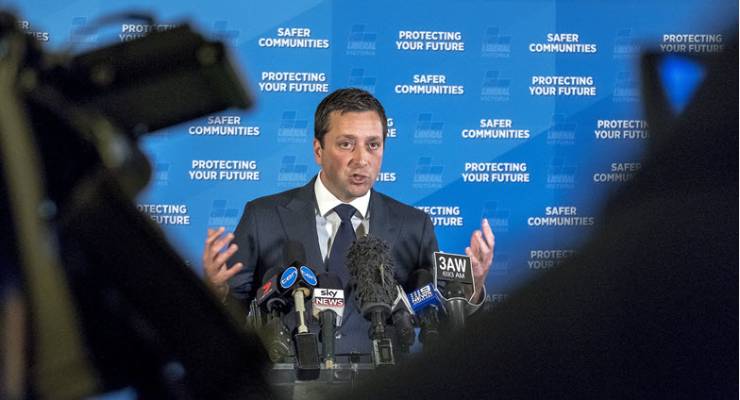
Victorian Opposition Leader Matthew Guy
In its lengthy January 6 report, The Australian cited the latest census data as suggesting there were over 20,000 Sudanese-born Australian residents, with around 11,500 living in Melbourne. Today’s front page Herald Sun splash, quotes “intelligence” as putting the Apex Gang core at 50 members. Let’s imagine all 50 are of Sudanese heritage. If we divide 50 by 20,000 and multiply by 100, we get the percentage of Sudanese people involved in this gang. By my calculation, it is about 0.25%.
“But hang on, you left wing politically correct former Federal Liberal Party candidate!” you may exclaim. “What about that Menace To Society mob?” Well, the same mathematics could be used again, once we know just how many are in this group and how many of them are South Sudanese. (No, not Sudanese in the manner of Yassmin Abdel-Magied. I mean South Sudanese. They are two separate countries now.)
“Well even if they aren’t Sudanese, they’re still African.” I guess that is true, though not all Africans look the same. But then, facts have not been the mainstay of the reporting of the alleged “African gang crisis”.
Catherine Marshall, one of my favourite travel writers, is of African descent. She happens to come from the same African country as a magnificent cricketer named Hashim. There’s another African bloke in Australia named Akmal who tells lots of funny jokes and appears quite regularly on TV.
What I’m trying to say is that to describe someone as African is meaningless. Africa is a huge continent, one into which you could easily fit much of Earth’s non-African land mass. How does one profile an African when the largest Arabic-speaking country on the planet is in Africa? How can you tell who is African and who isn’t?
Let’s be honest. This is about profiling black people, those who meet our ignorant stereotype of what it means to be African: skin colour. But as I’ve illustrated above, to be African isn’t a black or white issue. To be African means to be black or white or brown. I have Eritrean friends who look South Indian. I have South African friends whose ancestors were north Indian. I have Liberian friends whose complexion is visibly darker than my straight-haired Somali friends. How do we profile an African?
It’s a bit like profiling a Muslim. Profiling links “Muslim” to anything that might be considered a terrorist act. It’s enough evidence for them that a person was from a Muslim family, had a Muslim granny, had black/brown skin or looked “Middle Eastern” or may just have converted.
But let’s return to this new thing called “African gangs”. Let’s just imagine that 0.25% of the South Sudanese communities are involved in gang violence. What is the solution? Do we just kick them out if they aren’t citizens? Imagine we take a kid convicted of a serious offence, perhaps his first offence. We fly him back to war-torn Sudan. He has never lived there, has no family there other than relatives he has never met. He can barely speak the language, cannot understand the deadly politics of the civil war.
“Forget him. He got what he deserved,” may be the Dutton-esque, Herald Sun/Daily Telegraph/Coalition-desperate-to-stay-in-power response. But what about the family this kid leaves behind? The kid may have four siblings still at school. If lucky to have both parents alive, which for many South Sudanese refugee families is not always a given, the kid’s parents may be left with severe resentment and depression on top of the trauma that they may have already experienced thanks to the war.
Dutton’s solution of just deporting people is a recipe for breaking up families and extending trauma. It’s a cop-out based on the basest and most irrational form of racism that tells us that people who don’t look like “us” are more likely to be dangerous than, say, a white-skinned priest who engages in unspeakable acts with children.








They want to win so much they don’t care what they piss on and screw to do it.
In Homer Dutton’s Springfield Qld Townsville has a law and order issue re “out of control juvenile gangs”; there are parts of the Gold Coast that are silly to chance at night; last week we had a couple of gob-shites car-jack a couple of cars, from Sunnybank to beyond Gympie and return, having stabbed a bloke in the hand in the process – none of which is “African”?
Does “Milhous” Turnbull, Homer, “Waylon” Hunt and the rest of the Simpletons go on about our “Australian gang violence” – when there’s no xenopphobic anti-Labor votes in it?
Really? Then just what do you mean by the word, “media”? Many of us still think that radio is a medium, and “media” is a pretentious way of saying “mediums”. Perhaps you mean that journalists of a certain profile are abusive bigots and should be sent back where they came from… 🙂
I would be happy to see Dutton confined to somewhere unpleasant for the term of his natural life. Where was the shout about the Christmas and New Year destruction? Oh, soooorrrrry, that was white kids. Of course there will be an a spike in crime, there always is when a new disadvantaged group hits town. Dutton should get off his arse and see what his department can do about improving migrant services. This complete failure to do the work has been a problem for many many years. I remember we used to complain about Vietnamese drug dealers and no doubt John Howard loved it. Now we have a former refugee as a governor. I read an article recently in Wartime by Chris Masters telling of Corporal Albert Trinh who apparently joined to repay the country that gave his Vietnamese family a fresh start. A brave man and bloody near unkillable. Dutton is a blight on this nation of the kind I thought and hoped we had left behind with Sir Joh, the bullying Queensland copper who is never called to account. Kick a few backsides and these blokes will mostly be good Aussies in a few years if we don’t permanently alienate them. Based on the very few African people I have met, they would be ashamed of these few fools, but I reckon we are more likely to rehabilitate the youth than the lying scum of politicians.
Malicious Peter, not bright as a button,
With head full of potato and past use by mutton.
Which Herald Sun were you quoting from, Irfan? The edition I read noted that “At its peak, Apex had 60 core members, 20 of whom were foreign citizens, 34 foreign-born naturalised Australians, and 6 Australian-born.” No mention of Africans there.
Did you miss the Financial Review (or ABC) article(s) this week which pointed out that South Sudanese make up 0.14% of the state’s population, but account for 1.5% of its crime? And if you isolate certain violent crimes the proportion is higher. These are the facts. And hence the fine idea for Vic Police to engage with South Sudanese community leaders to address the problem whilst correctly stating the goddamn obvious that it is not every member of said group offending.
Your politically correct authoritarianism would have it that we cannot acknowledge different racial groups commit crimes at different rates. Instead of using that information to actually address the problem, best to censor it and screech racism to further your ideological agenda.
Hey, we could even recognise that the rates of offending by race change over time. Wouldn’t that be something useful?!